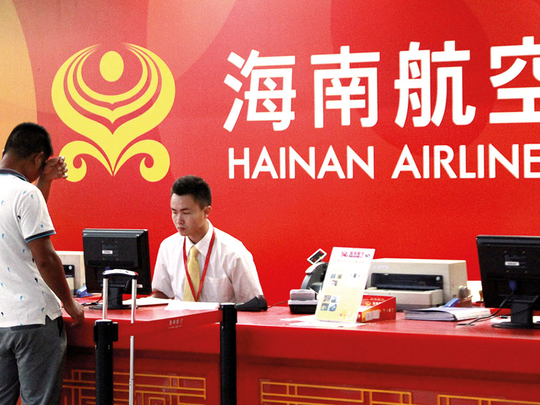
Shanghai/Beijing: HNA Group Co, one of China’s most indebted companies, is facing increasing difficulties raising funds as scrutiny mounts over the acquisitive conglomerate’s surging borrowing costs.
In the past week, S&P Global Ratings and Fitch Ratings have voiced concerns about at least four companies because of their ties with HNA. Separately, group flagship Hainan Airlines Holding Co cancelled a bond sale, another unit scrapped a share offering and HNA subsidiaries have been paying some of their highest borrowing costs ever.
The setbacks add to the pressures piling up at the largest shareholder of Deutsche Bank AG as the Chinese conglomerate stares at about $28 billion in short-term debt at a time the company is unable to earn enough profits to cover its interest payments. As difficulties mount — HNA has also been under scrutiny from the Chinese government over its debt-fuelled acquisitions — Chief Executive Officer Adam Tan said last week the conglomerate is considering selling assets, suggesting the company is reversing a shopping spree that cost tens of billions of dollars.
“This is a wake-up call to HNA Group that it needs to address the key challenges of having an over-complicated group structure, high financial leverage and lack of transparency,” said Corrine Png, CEO of Singapore-based Crucial Perspective Pte, a specialist in Asian transportation equities. “This again reflects the credit agencies’ lack of confidence on HNA Group’s financial position.”
Still, HNA hasn’t given up on fund-raising. Tianjin Airlines Co plans to issue 1 billion yuan of bonds, while Bohai Capital Holding Co. is seeking to offer 1.5 billion yuan of bonds this week, according to Chinamoney.
“There has been a clear revision downward in investor perception of the HNA entity and its subsidiaries,” said Todd Schubert, head of fixed-income research at Bank of Singapore Ltd. “For potential debt issuance, the net result will be significantly higher coupon rates.”
HNA representatives couldn’t immediately comment for this story. The following is a summarised list of HNA’s recent setbacks:
Avolon
On Wednesday, Fitch voiced concerns about Avolon Holdings Ltd, the aeroplane-leasing company, and its ties with Chinese parent HNA. The ratings firm highlighted $365 million in loans originated from Avolon that were provided to another HNA unit during the third quarter, bringing into question the independence of Avolon’s decision-making process. Fitch also cited concerns about reports that HNA units have been delaying aeroplane-lease payments. Avolon didn’t immediately respond to requests for comment, while Hainan Air said it has good cooperative relationships with lessors, and that they have been keeping positive and friendly communication with them.
“HNA’s biggest challenge is that the market has always been struggling to understand the internal money transactions of HNA,” said Lyu Pin, a credit analyst at Citic Securities Co. “It is difficult to sort out the intricacies around a myriad of money transfers between these HNA units.”
Swissport
On Tuesday, S&P cut its long-term corporate rating on Swissport Group Sarl to B-, six levels below investment grade, citing increasing concerns about the Chinese parent.
Gategroup
On November 29, S&P cut its rating on the Gategroup Holding AG, a Swiss catering HNA unit, citing “significant debt maturities and tightening liquidity” at the Chinese parent.
UDC Finance
On November 29, S&P said it expects to cut UDC Finance Ltd’s credit rating if the New Zealand company’s sale to HNA is completed.
Hainan Air
HNA’s flagship airline said Wednesday it scrapped plans to sell 1 billion yuan ($151 million) of perpetual securities in China’s local market to repay maturing debt. The cancellation comes amid growing strains for HNA Group from a debt-fuelled $40 billion acquisition spree across six continents. The deals have invited scrutiny from regulators across the globe and put the company in the crosshairs of a Chinese government that’s clamping down on capital outflows. Hainan Airlines said it cancelled the sale because of the “market environment” and said the airline has a sound business operation.
One of Hainan Air’s bonds fell the most on record on Wednesday after Bloomberg reported on the cancelled sale.
Read more in this QuickTake on why HNA has been worrying regulators
Deutsche Bank
BaFin, the German financial supervisor, is probing whether HNA accurately reported its holdings when building its stake in Deutsche Bank, according to two people with knowledge of the matter in early December. A spokesman at HNA said at the time the company’s voting rights communications have always been correct, while a representative for the regulator declined to comment.
HNA Investment
HNA Investment Group Co said this week it scrapped a proposed 5.2 billion yuan share sale after the company failed to get regulatory approval for the deal. The company, whose businesses range from real estate to hotel management, said it withdrew the plan after it didn’t receive a finalised written approval for the private share placement from the China Securities Regulatory Commission. The company, which cut the size of the offering from an initial plan of 12 billion yuan in 2015, planned to use the proceeds to invest in Sinosafe General Insurance Co. and a medical firm, according to the filing.
More airlines
HNA’s Yunnan Lucky Air Co sold a 270-day yuan bond to yield 8.2 per cent last week, the highest coupon rate ever for the Yunnan airline. Tianjin Airlines, another subsidiary of Hainan Airlines, issued similar-maturity notes at the highest coupon rate in five years in November. While surging onshore bond yields last month forced Chinese companies to cancel the most bond offerings since April, HNA’s units didn’t slow their pace of financing. They revived debt sales from November, following a lull after news emerged in June about a crackdown by China’s banking regulator. The accelerated fund-raising suggests a need for money and may hurt the conglomerate’s credit profile, according to credit research firm Bondcritic Ltd.












